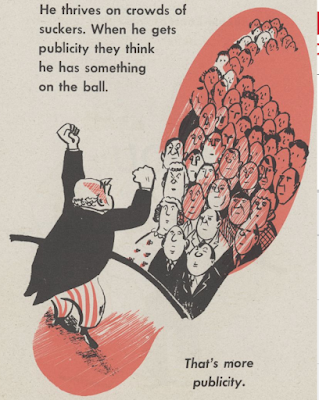On December 3, 1861, President Abraham Lincoln sent what was then known as the president's Annual Message to Congress, summing up the challenges of his first year in office. (These constitutionally mandated presidential communications were delivered in writing until 1913 when Woodrow Wilson began the custom giving a speech and weren't called the "State of the Union" messages until the 1930s during FDR's term.)
This tidbit from that document is often pulled and publicized for Labor Day to express Lincoln's appreciation for workers. I thought it would be interesting to explore the context from which it emerges.
Though the short bit reads as high political theory, the context is not. For example in this document, Lincoln reports to Congress that the Post Office shows:
... an excess of expenditure over the revenue for the last fiscal year of $4,557,462.71
Some things don't change, but they don't usually make it into the report in subsequent years ...
However, Lincoln had much larger problems than minor fiscal shortfalls. The context of the message is that several Southern states have gone to war against the Union, against the federal government. Its conclusion speaks to the great context of that rebellion.
It continues to develop that the insurrection is largely, if not exclusively, a war upon the first principle of popular government--the rights of the people. Conclusive evidence of this is found in the most grave and maturely considered public documents, as well as in the general tone of the insurgents. In those documents we find the abridgment of the existing right of suffrage and the denial to the people of all right to participate in the selection of public officers except the legislative boldly advocated, with labored arguments to prove that large control of the people in government is the source of all political evil. ...
The rebellious states were not fighting for popular democracy, were founded in privilege and prejudice. The Confederate vice-president, Alexander Stephens, was not shy about the purpose of the revolt: "Our new Government is founded upon exactly the opposite ideas; its foundations are laid, its cornerstone rests, upon the great truth that the negro is not equal to the white man; that slavery, subordination to the superior race, is his natural and moral condition."
Lincoln thought otherwise.
Monarchy itself is sometimes hinted at as a possible refuge from the power of the people. In my present position I could scarcely be justified were I to omit raising a warning voice against this approach of returning despotism.
For Lincoln, the foundation of American government was that it promised equality of opportunity to the working man. (Yes, he did mean
man.)
... It is assumed that labor is available only in connection with capital; that nobody labors unless somebody else, owning capital, somehow by the use of it induces him to labor. This assumed, it is next considered whether it is best that capital shall hire laborers, and thus induce them to work by their own consent, or buy them and drive them to it without their consent. Having proceeded so far, it is naturally concluded that all laborers are either hired laborers or what we call slaves. And further, it is assumed that whoever is once a hired laborer is fixed in that condition for life.
Now there is no such relation between capital and labor as assumed, nor is there any such thing as a free man being fixed for life in the condition of a hired laborer. Both these assumptions are false, and all inferences from them are groundless.
That is, for Lincoln, the point of the government and constitutional system which he had been elected to lead, was to ensure opportunity to workers -- all workers -- to make what they could of their economic circumstances. This message came two years before the necessities of Civil War forced Lincoln to issue the Emancipation Proclamation and to begin freeing the enslaved people of the South. Events would force him to see the necessity of broader inclusion.
The idea of freedom for labor was essential to his idea of the country; the time for free labor to include all men regardless of race had not come yet in 1861, but from this platform, Lincoln could move on toward universal free labor.
Hence his famous declaration of the superiority of workers:
Labor is prior to and independent of capital. Capital is only the fruit of labor, and could never have existed if labor had not first existed. Labor is the superior of capital, and deserves much the higher consideration.
Lincoln did not visualize a future in which industrial and finance capital dominated and exploited most workers.
Capital has its rights, which are as worthy of protection as any other rights. Nor is it denied that there is, and probably always will be, a relation between labor and capital producing mutual benefits. The error is in assuming that the whole labor of community exists within that relation. ...
He trusted the democratic future of the country to free workers. They would preserve the Union of the states and government by the people.
... as has already been said, there is not of necessity any such thing as the free hired laborer being fixed to that condition for life. ...
No men living are more worthy to be trusted than those who toil up from poverty; none less inclined to take or touch aught which they have not honestly earned. Let them beware of surrendering a political power which they already possess, and which if surrendered will surely be used to close the door of advancement against such as they and to fix new disabilities and burdens upon them till all of liberty shall be lost.
Although the economic system of the United States of America didn't turn out as Lincoln envisioned, those of us lucky enough to be born here should be grateful that newcomers, from all over the world, still struggle and die to come here -- to what still seems to them to be a land of opportunity for workers. These days, it is often those newcomers who make the country rich and strong. They are much of the backbone of what we call "organized labor," the union movement which fights to constrain capital.
As Lincoln knew, and the Rev. Jesse Jackson echoed when he sought the presidency in 1988, that energy of aspiration for better futures keeps hope alive.


































